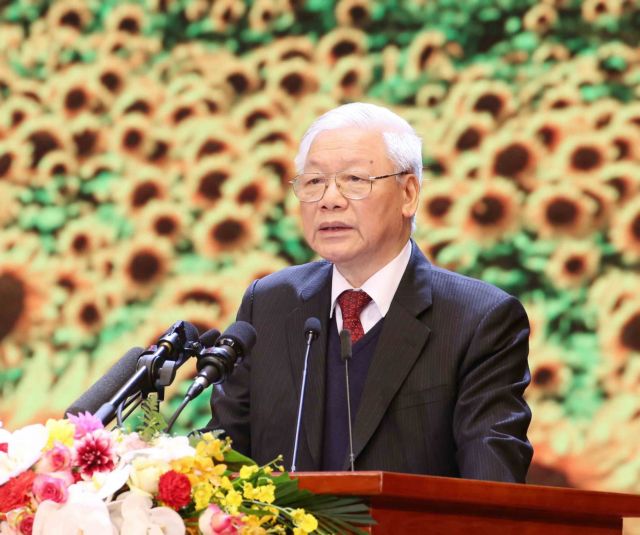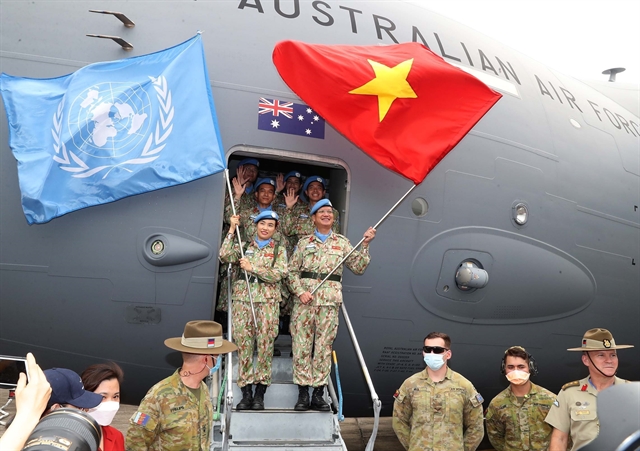 Politics & Law
Politics & Law


|
| Party General Secretary Nguyễn Phú Trọng has linked Việt Nam’s foreign policy to bamboo, with strong roots, solid stems, and flexible branche in many meetings and conferences. VNA/VNS Photo Phương Hoa |
by Linh Hà, Hồng Nhung
Bamboo holds a significant place in Vietnamese history, culture, and people’s daily lives, symbolising strength, flexibility, and resilience.
Việt Nam’s determination to pursue a foreign policy that draws on these characteristics is seen as a pragmatic response to the challenges facing the country in a rapidly-changing world, according to scholars.
The term “bamboo diplomacy” was coined by Party General Secretary Nguyễn Phú Trọng during a diplomatic conference in 2016 and reiterated at the first national conference on foreign affairs in 2021. During these gatherings, the leader linked Việt Nam’s foreign policy to bamboo, with strong roots, solid stems, and flexible branches.
Phan Xuân Dũng, Research Officer at the Vietnam Studies Programme of the Singapore-based ISEAS - .Yusof Ishak Institute, pointed out that bamboo grows in groups and is stronger when standing together, reflecting the importance of collective strength and unity in Vietnamese culture, making it an ideal embodiment of Việt Nam’s foreign policy.
Strong roots are core guiding principles such as national interests, independence, self-reliance, diversification, and multilateralisation of external relations. These principles are deeply rooted in late President Hồ Chí Minh’s thoughts on diplomacy and provide the foundation for the country's foreign policy, Dũng said.
The solid stems signify Việt Nam's resilience in implementing its foreign policy despite the various challenges it is facing. This reaffirms Việt Nam as a friend to all nations, one that is building strong relationships that can withstand strong storms.
The flexible branches represent Việt Nam’s ability to be steadfast in principles while being flexible in tactics, he said.
Carl Thayer, Emeritus Professor at the University of New South Wales, said by understanding the concept of bamboo diplomacy, anyone can gain valuable insights into the building blocks of Việt Nam’s success.
Bamboo diplomacy is not only about reacting to great power shifts, but also about promoting Vietnamese culture, identity, and economic ties with strategic and comprehensive partners, he said.
He went on that Việt Nam’s bamboo diplomacy is characterised by independence, positivity, and a commitment to non-interventionism, stressing that Việt Nam can be counted on to uphold its values and principles, even in the midst of a complex and ever-changing geopolitical landscape.

|
| Vietnamese military engineers and military doctors are set for the United Nations peacekeeping mission in South Sudan in 2022. VNA/VNS Photo Trọng Đức |
Scholars have also suggested that to understand the rationale behind Việt Nam’s bamboo diplomacy, it is crucial to grasp the country’s long struggle for national independence.
Yoichiro Sato, Professor at the Ritstumeikan Asia Pacific University, said given Việt Nam’s history of war and the need for self-reliance, it is understandable why bamboo diplomacy became an important and fundamental aspect of Vietnamese culture and national character. “Việt Nam’s bamboo diplomacy is a realistic approach to protect its national interests,” he said.
Having the same opinion as Sato, Stephen Nagy, Professor at International Christian University, said Vietnamese bamboo diplomacy is pragmatic, realistic, and regionally focused. “It’s pragmatic in terms of forming relationships with all different kinds of countries, primarily focusing on Southeast Asia, and working with extra-regional partners to improve its security, stability, and prosperity.”
Việt Nam has so far established diplomatic ties with 190 out of a total of 193 UN members. Meanwhile, the Party has established relations with 247 political parties in 111 countries, and the National Assembly has relationships with the parliaments of 140 countries, according to the Việt Nam’s Ministry of Foreign Affairs.
Bamboo diplomacy: From words to action
According to scholars, Việt Nam’s bamboo diplomacy has been successful in maintaining pragmatic relationships with major powers, while ensuring its national interests are protected.
“Việt Nam has undertaken some economic reforms over the past 40 years to attract overseas development aids, as well as foreign direct investment to position itself as a new manufacturing hub in Southeast Asia. The move contributes to increasing prosperity and accelerating the development of Việt Nam,” Nagy said.
Both Dũng and Nagy see Việt Nam as a middle power. They quoted the Asia Power Index 2023 from the Lowy Institute as saying that by the latest rankings, Việt Nam was the second-most diplomatically influential country in Southeast Asia, behind only Indonesia, which is the region’s largest country in both population and economy.
“If we use data sets like the Lowy Institute’s Asia Power Index, it’s clear that Việt Nam is a middle power in terms of its overall resources, population, economic size, and diplomatic power,” Nagy said.
Meanwhile, Thayer provided a concrete example that demonstrates the success of Việt Nam’s bamboo diplomacy in promoting cultural values - the country’s ability to attract a growing number of tourists and build strong bonds with people from different countries, based on the appeal of Vietnamese culture, politeness, and cuisine.
He said this soft power approach is a key component of Việt Nam’s bamboo diplomacy, which emphasises the need to build positive relationships with other countries and foster mutual understanding and respect.
Agreeing with Thayer, Dũng said by promoting the diplomatic identity of resilience, solidarity, and flexibility embodied by bamboo, Việt Nam showcases its unique cultural identity and fosters a positive image of the country abroad.
After a two-year hiatus due to COVID-19, Việt Nam reopened its doors to international tourists on March 15, 2022, and has since seen a surge in foreign holidaymakers visiting the country. According to the latest data from the General Statistics Office, Việt Nam welcomed 2.69 million foreign arrivals in the first quarter of this year, representing a nearly 30-fold increase compared to the same period last year.
The scholars also acknowledged Việt Nam’s active role as a member of the Association of Southeast Asian Nations (ASEAN), and its ability to bridge ASEAN member states with extra-regional countries.
Bamboo diplomacy: Path ahead
Scholars have highlighted the growing number of challenges that Việt Nam is facing as it navigates the rapidly changing global situation. These challenges are being exacerbated by various factors, including global geopolitical tensions and economic recession, which require creative solutions and significant efforts to tackle.
To counter these headwinds, Thayer said Việt Nam must act with great care and skill if it wishes to maintain its independence, promote its interests, and uphold its values.
Viet Nam could leverage its relationships with multiple partners to its advantage, even if these partners have disagreements with each other.
“This is possible because Việt Nam can capitalise on its position as a trusted partner and mediator to help resolve disputes or find mutually beneficial solutions,” Thayer said.
According to Sato, as Việt Nam experiences strong growth, greater effort is required to build on its accomplishments. He emphasised the importance of the country continuing to promote its national unity, just as it did throughout its long struggle for national independence, even during the COVID-19 pandemic.
Meanwhile, Dũng and Nagy held that Việt Nam must ensure sufficient flexibility, resilience, and adaptability to maintain its strategic autonomy, good partnerships, and sound relations with all nations.
Moving forward, Việt Nam will continue with its bamboo approach, which means being more resilient, flexible, adaptable, and cooperative with all partners to protect its national interests, according to the scholars. — VNA/VNS




